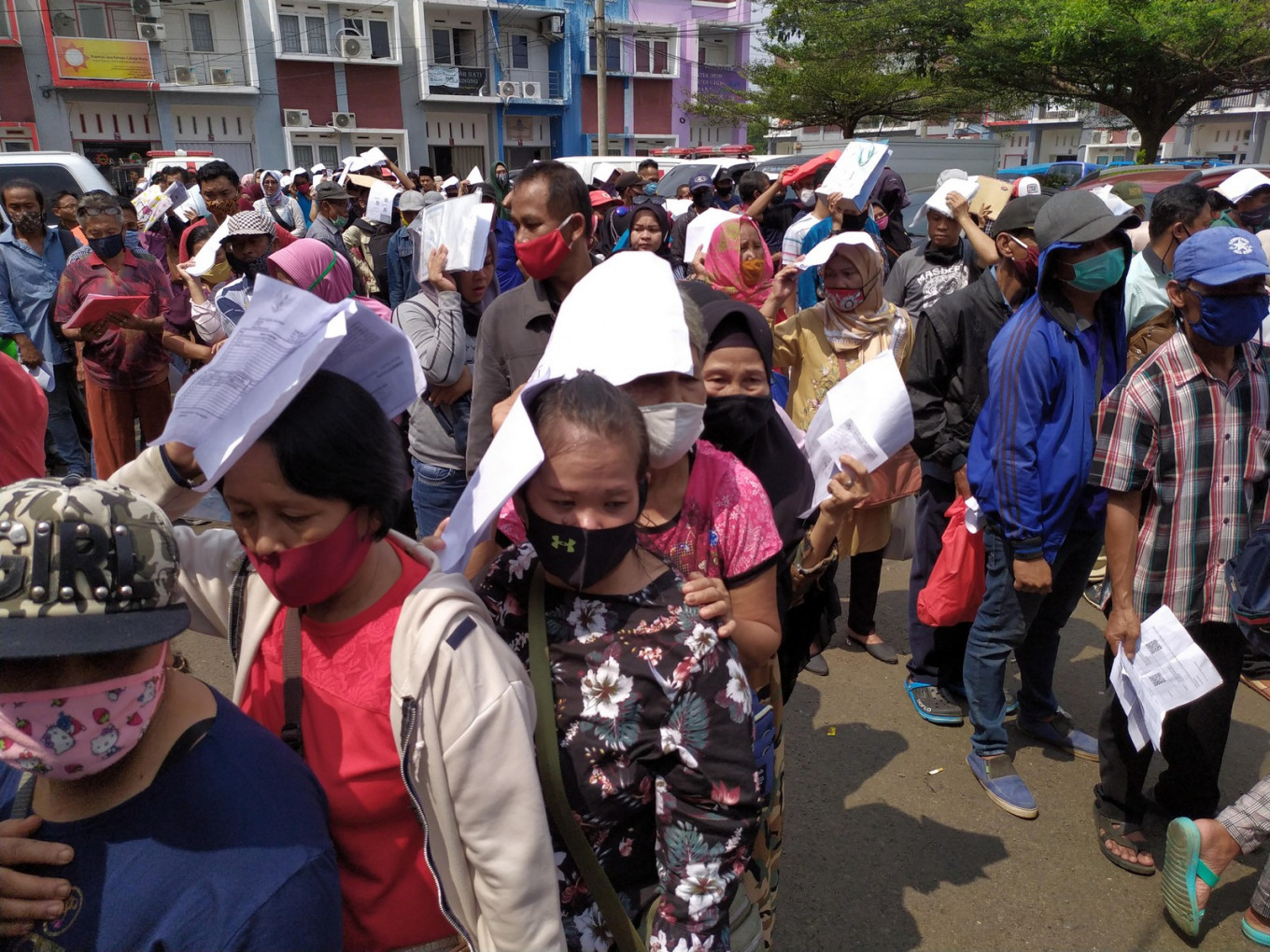Popular Reads
Top Results
Can't find what you're looking for?
View all search resultsPopular Reads
Top Results
Can't find what you're looking for?
View all search resultsSlow budget realization drag on economic recovery: Experts
Sucor Sekuritas head of research Adrianus Bias said that while market players welcomed the government’s budgeting and funding for the COVID-19 relief programs, the key factor was still budget realization.
Change text size
Gift Premium Articles
to Anyone
 People queue to receive government social cash transfers (BST) at an office complex in Cibinong, Bogor regency, West Java, on July 20. The Social Affairs Ministry worked with post offices to channel the financial assistance to underprivileged residents from May until July. Each recipient received Rp 600,000 (US$42) per month. JP/P.J. Leo (JP/P.J. Leo)
People queue to receive government social cash transfers (BST) at an office complex in Cibinong, Bogor regency, West Java, on July 20. The Social Affairs Ministry worked with post offices to channel the financial assistance to underprivileged residents from May until July. Each recipient received Rp 600,000 (US$42) per month. JP/P.J. Leo (JP/P.J. Leo)
T
he government’s slow budget realization has hindered the country’s economic recovery, as the COVID-19 pandemic puts continuous pressure on people’s purchasing power, experts have warned.
Sucor Sekuritas head of research Adrianus Bias said that while market players welcomed the government’s budgeting and funding for the COVID-19 relief programs, the key factor was still budget realization.
“What we are actually waiting for is the budget absorption from the government,” Adrianus told The Jakarta Post on Tuesday.
Adrianus noted that many companies had seen improvements over the past months as the large-scale social restrictions (PSBB) were gradually relaxed beginning in June. Going into August, several companies have already reported running at a 75 to 80 percent capacity against pre-COVID-19 levels, he said.
“It’s a bit frustrating, really, looking at the current conditions but then the bureaucracy is still dragging out the [budget] realization. Hence, the economy cannot recover to its full potential,” he added.
The government has earmarked Rp 695.2 trillion (US$47.2 billion) in stimulus measures to strengthen the country’s healthcare response and boost the economy amid the ongoing health crisis.
However, the budget disbursement has only reached Rp 145.4 trillion of the total COVID-19 response funds, equal to 20.9 percent, dominated by spending on social protection and the micro, small and medium enterprises (MSMEs) stimulus, while other kinds of stimulus such as for health care and corporate financing, among others, have lagged.
The country’s gross domestic product (GDP) contracted by 5.32 percent year-on-year (yoy) during this year’s second quarter, significantly lower than the growth in the first quarter at 2.97 percent, Statistics Indonesia (BPS) data showed.
While household spending, which makes up more than half of GDP, fell by 5.51 percent, government expenditure, expected to boost the economy while people’s purchasing power faltered, dropped by 6.9 percent in the second quarter.
President Joko “Jokowi” Widodo has repeatedly urged his Cabinet to disburse funds quicker, pushing government officials to operate with a sense of crisis considering the wide-ranging impact of the pandemic on the Indonesian population.
“This shows that ministries and government institutions still do not have a sense of urgency. Officials are still fixated on their day-to-day duties,” Jokowi said prior to a limited Cabinet meeting on Monday.
On Wednesday, Indonesia confirmed 1,815 new COVID-19 cases, bringing the number of infections to 116,781 nationwide, with more than 5,400 deaths, official data showed. The country surpassed the 100,000 figure on July 27 following the gradual reopening of the economy.
Mirae Asset Sekuritas Indonesia economist Anthony Kevin told the Post on Monday that the government’s social assistance had yet to reach the layer of the population that needed the funds the most.
“The government is not proactive enough in trying to spread its social safety net. This is what is hindering Indonesia’s economic recovery,” Anthony said.
Reaching the middle- to low-income segment was necessary for an economic recovery, Anthony noted, as they represent more than 50 percent of Indonesia’s economy and have a greater marginal propensity to consume in comparison with the middle- to upper-income segment.
In a report published on Tuesday, Anthony wrote that the problem with the reopening of the economy was that the demand side often failed to catch up with the supply side.
“As for Indonesia, we believe the situation is much more severe, as high levels of fear over weak demand eventually discourages producers from boosting production in the first place,” he noted.









